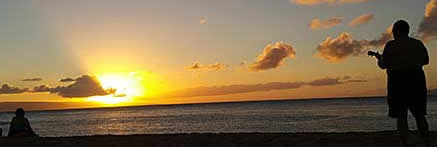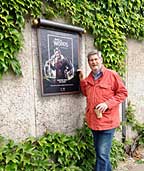 |
|
FOUR SPARKLING DAYS CRUISING ALASKA |
|||
Story and photos by Brad Hathaway |
|||
Our bucket list has long featured a trip to the inner passage of Alaska. We’d been on the land in our northern-most state, but never sailed into its fjords. As the cruise industry emerged from the pandemic-inspired shutdown, Carnival offered a round trip from the pier in San Francisco that is just ten miles from our home on a houseboat in Sausalito. How could we resist?
When we got to the terminal we joined a long line of passengers waiting to get in to process the embarkation documents (along with our covid test results). Once inside, it was more waiting in line.
But soon it was “all aboard!” We joined our fellow passengers at the railing to watch the San Francisco skyline recede, Alcatraz Island pass by, and the Golden Gate Bridge glide above us.
After two days at sea where we encountered rough water with winds of 75 miles per hour and swells of 15 to 18 feet, we entered the silky-smooth waters of the inland waterway in the pre-dawn morning.
As soon as the sun was up, passengers again appeared on deck to capture scenes of snow-capped peaks.
We sailed up the Icy Straight Passage where a tugboat arrived to escort our ship to the floating pier serving Hoonah, a tiny Tlingit hamlet (population 931 … when no ship is in port) on the island of Chichagof at Icy Strait Point. “Hoonah” is the anglicized spelling of a Tlingit word meaning “protected from the north wind.” It surely felt protected the day of our visit with still air, warm sun and a near cloudless sky.
A statue of an Orca (killer whale or Orcinus Orca) greeted us on the shore.
We proceeded to the Duck Point Bar where we left for a tour of the town. It took us past the children’s playground, the town cemetery, and even a familiar sight: a houseboat.
Our guide stopped to give us the lowdown on how to read a totem pole (one segment at a time, top to bottom). This one was in the parking lot of the local high school, but we spotted others during our tour, even one decorating a creek that flows through town.
After the tour we boarded the lower of two tramways that take visitors up to the longest zipline in the world. It’s called the Ziprider and takes brave people down from the summit at 1,330 feet to sea-level in a - you should pardon the expression - “zip.”
Our ship was the only one at the Hoonah pier. But the next day, when we pulled into the port of the old mining town of Skagway, we found the Norwegian Jewell already docked.
We tied up at a pier opposite a railroad track where a train waited to take us and other passengers on one of the most scenic trips we’d ever enjoyed.
The White Pass & Yukon Railroad, built during the Klondike Gold Rush in 1898, took us in vintage train cars up to the summit at 2,865 feet, climbing steep grades for 20 miles to the border with Canada’s Yukon Territory.
There were thrilling views as we climbed up the east side of the Boundary Range of the Coast Mountains that separate Alaska and Canada. We experienced magnificent views of glacial valleys, railroad trellises, cascading rivers and falling meltwater from the snowpack.
Then we arrived at a tunnel cut into the solid rock separating the verdant valley from the snow-covered summit.
Having exited the tunnel, the train passed through canyons cut from the snowfall and proceeded a few miles into Canada to a roundabout allowing us to return on the same track.
Finally, we headed back down seeing even more gorgeous scenery on this sparkling, nearly cloudless day.
The next day was yet another sparkler. We pulled into the state’s capital city, Juneau, to find a bustling mid-sized city with an up-beat vibe. Again, we weren’t the only ship at the dock. The Carnival Splendor was already at the port’s cruise pier.
Our adventure of the day was a visit to the easily accessible Mendenhall Glacier, one of the prime attractions of the Tongass National Forest, which lays claim to being the largest of the nation’s forests. The Glacier’s half-mile wide face is at the receding end of a hundreds-of-feet-deep glacier which is but one finger of the 1,500 square mile Juneau Icefield.
The Mendenhall Glacier is visible from the picture windows of the National Forest Service’s visitor center which also features exhibits and an informative film. The Forest Rangers offer talks covering a host of glacier- related topics but it seemed to us that the visitors paid more attention to their phones than to the glories outside.
We proceeded up an easily navigable path around Mendenhall Lake to a place where the glacier itself was visible. Right next to it was Nugget Falls, an ice-melt-fed waterfall that thundered down into the lake right at the beach on which we stood.
The city of Juneau has much to offer downtown as well. We found a great spot for lunch, the Hangar on the Wharf, in the building that had been the hangar for the airline which has now become Alaska Airlines. They have a fabulous hefeweizen on tap.
Juneau is the capital city of the state of Alaska. While the Capitol Building may not be the most impressive of the fifty state capitol buildings in the US, it is still worth a quick visit.
Across the street from the Capitol Building is the City Museum which sports, on its front lawn, a modern totem pole on a very contemporary topic: Harnessing of the Atom. It was carved by Amos Wallace in 1967 out of western red cedar. Using the interpretive skills we gained from our guide in Hoonah, we were able to note that the four figures, read from top to bottom, displayed a bald eagle, a Russian priest, a man and sun and a raven. The neighboring plaque explained the symbolism. The eagle represents the US which purchased Alaska from Russia. The priest signifies both Christianity and the Russian influence on Alaska. The third figure is man harnessing the power of the sun. The raven supports the entire totem, as Alaskan lore has it a raven released the power of the sun, moon and stars for mankind.
The new campus for Sealaska, an Alaskan Native corporation of Tlingit, Haida and Tsimshian people, is just a short walk from the capitol. It is decorated with totem-like pillars. Inside is an art-and-gift shop in which we found a small replica of a totem pole to take home.
Each day of our Alaska sojourn topped the day before. The weather was unbelievably bright, clear and sunny and the sights became more and more amazing. The next and final day of our cruise in Alaskan waters was the most amazing of the entire experience - a cruise up the 30 mile long Tracy Arm Fjord to the face of the Sawyer Glacier.
It began with relatively little ice in the water as we approached the wide entrance to the fjord, but the ice clumps became more numerous as we got closer to the towering walls of the the Tracy Arm.
We concentrated on the parade of waterfalls on either side of the ship, not paying that much attention to the increasing size and number of floating ice chunks.
The farther up the fjord we went, however, the more prominent the ice became.
Our ship slowed to a crawl as the captain sought paths through the ice while coping with treacherous winds bouncing between the walls on either side of the fjord. Soon, however, the ice was filling all paths forward and the ship had to stop.
We transferred to a smaller boat to try to get closer to the face of the glacier.
Suddenly, there it was! Some 200 feet high and filling the gorge it had carved out of solid rock since the last ice age, the Sawyer Glacier.
Feeling a supreme sense of satisfaction, we reversed course and headed away leaving the glacier behind us.
Two days later, it was a return to our home base houseboat as the sun rose over Treasure Island and the Bay Bridge. ABOUT THE AUTHOR
|































































